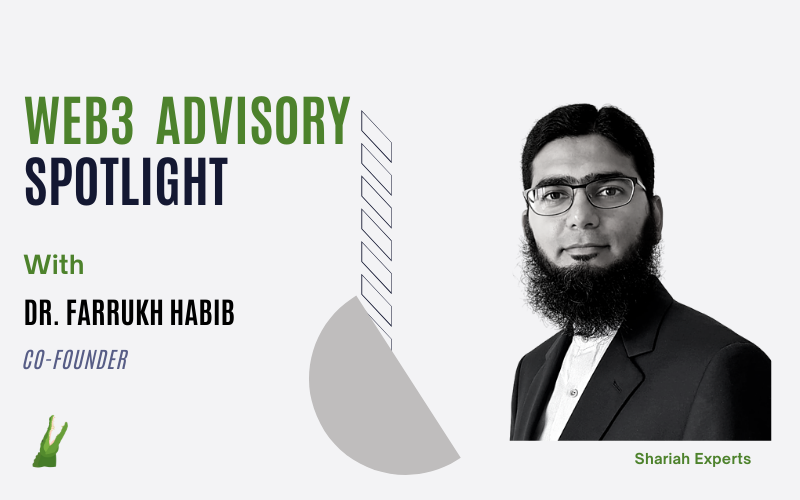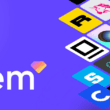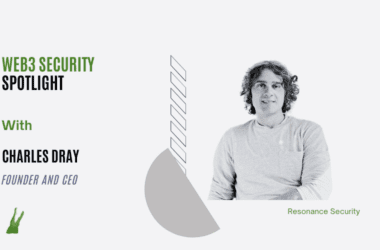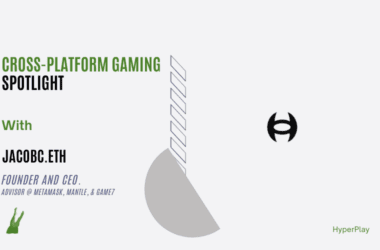For those in the Muslim world who need to make faith-based decisions in their investments or projects in the blockchain space, shariah compliance has been a topic of great concern.
According to a report by Fortune last November, Asrorun Niam Sholeh, head of fatwa, or religious decrees, at the Indonesian Ulema Council said that cryptocurrencies go against central the tenets of Islamic law as they contain elements of uncertainty, wagering, and harm and therefore shouldn’t be traded by Muslims. However, it wasn’t an official decree, nor did it ban crypto trading in Indonesia, the country with the world’s largest Muslim population.
To provide clarity and guidance on Web3 projects based on Islamic financial principles, Islamic scholar, researcher and fintech veteran Dr. Farrukh Habib co-founded Web3 advisory firm Shariah Experts last year. The firm’s scope includes NFT, the metaverse, DeFi, and crypto, and it aims to bridge the gap between the Web3 space and the Muslim masses by streamlining blockchain technology.
In April, Shariah Experts issued the world’s first NFT-based halal certification, marking a step forward for the Muslims in Web3. Following that, we catch up with Dr. Farrukh to find out more about the Islamic principles that determine whether NFTs are halal and why crypto exchanges have been setting up headquarters in the Middle East.
Please tell us about yourself and the story behind Shariah Experts and MHRB.
I am the co-founder of Shariah Experts (London), and the Chairman of the Shariah Governance Board of MRHB DeFi. I have expertise in Islamic law (shariah), finance, and fintech, with more than nine years of experience.
I came to know about Bitcoin and cryptos back in 2014. Being a researcher, I started critically analyzing this phenomenon from an Islamic monetary policy perspective. I officially initiated this research when the central bank of Malaysia (BNM) asked the research institute, where I was working, to prepare a report on the halal aspect of Bitcoin and other cryptos in 2016. Later, I successfully developed halal screening criteria for cryptos and blockchain projects and began advising crypto projects on shariah compliance.
I strongly believe in enhancing shared prosperity through blockchain, tokenization, NFTs, and metaverse in the halal economy, including Islamic finance. So, I joined MRHB DeFi at a very initial stage, almost two years ago, to make it the world’s first shariah-compliant DeFi platform. Several other projects were looking for such guidance so I formed Shariah Experts (London) with my partner, Mufti Billal Omarjee, who shares my passion, a year ago to cater to the crypto needs of the Muslim world.
What piqued your interest in the NFT space and where did you first hear about it?
Being in the crypto-verse long enough, I have been observing the evolution of NFTs with deep interest. It did not take me long to realize their great potential, particularly for the halal economy. Though there are many dimensions of NFTs that are fruitful for the halal economy, I believed that halal certification in the form of NFTs would be a good starting point. I bought my first NFT two years ago to participate in a token launch.
Where and how did you gain your knowledge and experience in the Web3 world?
Technology has always fascinated me; although I was trained as an Islamic legal expert and finance professional, being a researcher, I always think of finding shared economic prosperity, sustainability, and social betterment at the advanced technology frontiers. I mainly gained my knowledge of the Web3 world out of my curiosity through rigorous research and self-study. I constantly challenge my own concepts and ideas which helps me a lot in achieving clarity and finding ways to structure crypto products and services that are aligned with the Islamic ethical and social principles and rulings.
What are the financial principles that determine whether NFTs are halal?
Islamic law (shariah) offers a comprehensive set of rules and principles that are applicable and relevant in all the dimensions of human life, including, arts, finance, technology, cryptos, and even NFTs.
NFTs are a digital representation of something unique and valuable. So, the key to understanding the halal aspect of NFTs is to first comprehend the source of value for an NFT. The source of value for any NFT should be shariah-compliant for it to be considered halal. For example, an NFT representing a gambling product, such as Slotie NFT, is not permissible in shariah.
The second most important element is to comprehensively determine and divide NFTs into the categories that are recognized in Islamic law. For example, whether an NFT falls under the category of a good, commodity, service, or represents a tangible or intangible asset, etc.
When a proper categorization of an NFT with a recognition of its source of value is achieved, it becomes easy to not only decide whether an NFT is halal or not but also easy to see the logic of why such a ruling is applied.
Crypto exchanges with headquarters in the Middle East headquarters don’t mention shariah compliance. How would Muslim investors know if the blockchain businesses opening up in the UAE are halal or not?
Although shariah compliance is not mandatory for the exchanges or crypto projects to operate in the UAE or GCC, it is an important business decision for the crypto projects and exchanges to make. Earth is home to more than 1.9 billion Muslims, which is 25% of the global population.
This large number of people do care about their religious norms at different levels. Faith-sensitive investors and users surely appreciate a crypto project or exchange that is not against their religious values, in other words, halal. Due to the same reason, there is a high demand for halal projects.
I believe that shariah compliance is a crucial factor to be considered by the projects that are keenly looking into expanding their outreach in that region, as well as to other Muslim majority countries. Because this would increase the level of confidence and comfort of the Muslim userbase.
As for the knowledge of how to determine whether or not a blockchain business is halal or not, Sahal Wallet offered by MRHB Defi is one of the best ways to see a list of shariah-compliant crypto projects. Moreover, Shariah Experts Ltd has the expertise and focus on the crypto-verse to review and certify blockchain businesses as halal. We are also working on some concepts to cater to the needs of retail investors who are looking for a portfolio of shariah-compliant cryptos.
Do you know of any blockchain and NFT projects that have not been allowed to launch in the Middle East due to non-compliance with shariah law?
Since it is not a compulsory requirement, there is no such case.
Emirates, Qatar Airways, and the city of Dubai all have metaverse and NFT plans while major crypto exchanges are expanding into the Middle East, why do you think that is so?
Generally, the Middle East is a very interesting market, with high liquidity and a good appetite for innovative ideas and tech-driven solutions. Dubai, particularly, has a good reputation as a jurisdiction and an aggressive approach toward tech adoption.
Dubai intends to be the global hub for cryptos, NFTs, metaverse, and blockchain businesses. This intention is further reinforced by some serious actions, i.e., the launching of Emirates Blockchain Strategy 2021, the introduction of Dubai Virtual Asset Law, relaxed taxation, ensuring a conducive environment for crypto exchanges and projects, etc. That is why, Binance, Crypto.com, Bybit, and FTX are interested in headquartering here.
Another important factor is the global bans and restrictions emerging in Asian countries such as China, India, Thailand, and the USA procrastinating on regulations. Subsequently, Dubai is expecting to welcome more than 1,000 crypto businesses by 2022.
What are some of the most challenging aspects of bridging the gap between the Muslim world and the blockchain space? How do you overcome these challenges?
The Muslim world’s first biggest challenge in adopting cryptos is the Islamic legal (shariah) status of cryptos. The most crucial question is whether cryptos are halal (permissible) or haram (impermissible) in shariah.
Crypto technology and economic aspects put forward an unprecedented case to the shariah scholars. Adding more complexity, the negative media coverage, and legal and regulatory concerns about cryptos distracted them from objectively analyzing the phenomenon from the Islamic jurisprudential perspective. Unfortunately, many contemporary fatwas (Islamic verdicts) are a good reflection of this situation, showing a severe misunderstanding of the whole crypto phenomenon and superficial knowledge of those aspects.
To overcome this hurdle, we are, on the one hand, educating the Muslim population about cryptos and spreading awareness among the masses through conducting educational programs, workshops, and webinars. On the other hand, we are closely working with the crypto projects to help them understand their target Muslim market and provide them advisory and consultancy to make them shariah-compliant.
In multicultural secular countries with their own Islamic Religious Council that issues halal certificates to establishments that need to physically display them so that Muslim consumers know they are halal, how would NFT halal certificates be able to achieve the same goal of being seen by consumers?
NFT-based halal certificates are still relevant if there is a strict requirement from a religious council to physically display a halal certificate to the customers. A hard copy of the halal certificate can still be used, with a QR code on it that can lead to the actual halal NFT certificate. This method would offer real-time verification to the customers.
Shariah Experts issued its first NFT-based halal certificate to Singapore-based gold crypto platform, Cache.Gold. Did the platform bypass Singapore’s Islamic Religious Council or will the NFT certificate have to be verified by the council?
There is no obligation for a crypto project to be certified by a religious council of a specific jurisdiction. As a matter of fact, most religious councils do not have the required knowledge and relevant experience for certifying crypto projects. Therefore, it is not bypassing a local religious council but seeking the right proficiency.
Moreover, due to the global nature of crypto projects, it is better for such projects to be certified by an internationally well-recognized firm with domain expertise. Shariah Experts issued the NFT certificate, and this can be verified by the NFT itself which provides proof of ownership. This is already good enough, so there is no need for the NFT to be verified by a third party.
What do you think about the current state of the NFT market and how is Shariah Experts impacting it?
According to some research, the NFT market share is expected to increase by USD 147.24 billion by 2026, and the market’s growth momentum will accelerate at a CAGR of 35.27%. Although this growth is fascinating, there are a few challenges. The most crucial one is the uncertainty of the NFT space due to narrow usage and limited use-cases.
Shariah Experts aims to unleash the true potential of NFTs by utilizing their intrinsic features of transparency, authenticity, and uniqueness for real-world cases. For example, there is a serious problem of fabricating halal certificates with no clear method of verification. NFTs are a natural solution to this burning problem.
Furthermore, Shariah Experts is bridging the gap between the halal economy and tech-driven solutions by leveraging the blockchain, smart contracts, and NFTs. We believe that this would open the mind of the Muslim world and religious authorities leading to mass adoption and streamlining of cryptos and NFTs.
What can people look forward to from Shariah Experts and MHRB this year?
Shariah Experts has just started its journey to bring crypto projects to the Muslim world, while preparing Muslims to better understand and utilize them, at the same time. A lot more exciting stuff is going to be announced very soon, i.e., enabling crypto payments, presence in the metaverse, etc.
Shariah Experts is already finalizing some good collaborations with major blockchain businesses, regulatory authorities, universities, and other market players. MRHB DeFi has successfully launched two products, Sahal Wallet and SouqNFT. Two more products, DEXregator and Liquidity Harvester are going to be launched this year. At the same time, some interesting features are also going to be introduced to the existing products.
Where do you think we could see NFTs in the near future?
I foresee that NFTs will play a pivotal role beyond arts and music, by representing personal identities, educational credentials, vaccine certifications, DAO governance, KYC, regulatory compliance, etc. These are pretty obvious use-cases of NFTs. They can be implemented with a little effort, and the benefits would be countless.
Any other NFT-related industry issue you would like to talk about?
In the current state, NFTs have traditionally been associated with digital art and collectibles, with other applications being mostly unexplored. However, as the ecosystem matures, features such as digital identity, NFT utility, social currency, enhanced monetization potential, etc., will take centre stage and prove to be an essential component, with real-world applications in a variety of sectors. Overall, as the digital economies grow, NFTs are ready to become mainstream, playing a key role in bridging the virtual and real worlds and disrupting both new and old businesses.
Stay up to date:





